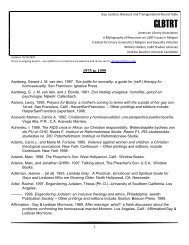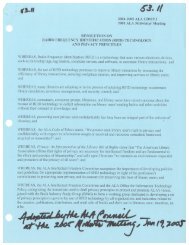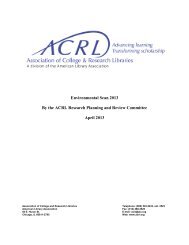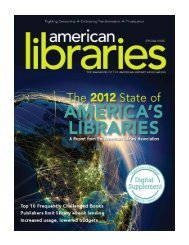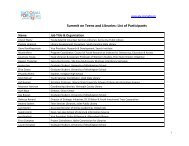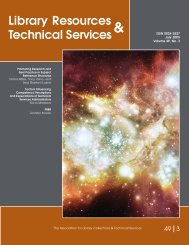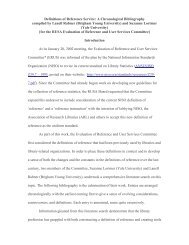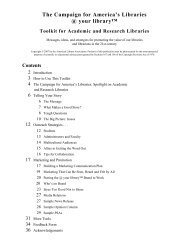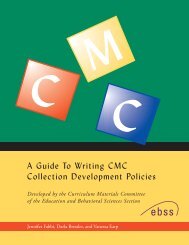Toolkit for School Library Media Programs - American Library ...
Toolkit for School Library Media Programs - American Library ...
Toolkit for School Library Media Programs - American Library ...
You also want an ePaper? Increase the reach of your titles
YUMPU automatically turns print PDFs into web optimized ePapers that Google loves.
and continues to rise. But the real pay off is the<br />
satisfaction you get from helping students discover the<br />
joy of reading and learn essential in<strong>for</strong>mation literacy<br />
skills. I feel like I’m making a difference in their lives not<br />
just today, but 10 or 20 years from now. As a profession,<br />
librarians are committed to protecting the freedom to<br />
read and ensuring that in<strong>for</strong>mation is freely available to<br />
all. I’m proud to be part of that.<br />
5. Why should the library get more money when we<br />
have to cut other areas?<br />
There is no such thing as good education without a<br />
good library. Studies have shown there is a direct link<br />
between student achievement and library media centers<br />
that are professionally staffed and well stocked with<br />
books and technology (see “More Tools/Research” on<br />
page 39). In the last five years, our media center’s<br />
buying power has decreased by [add number here]<br />
percent. Without an increase, we cannot provide the<br />
quality or quantity of resources that our students and<br />
teaching staff deserve.<br />
6. Since everything is electronic, shouldn’t the library<br />
need less money?<br />
Technology offers many advantages, but saving money<br />
isn’t necessarily one of them. Computers and other<br />
electronic resources must be maintained, updated and<br />
staffed. Also, everything is far from electronic. Our library<br />
has a large collection of books, magazines, videos and<br />
other learning resources that aren’t on the Internet—and<br />
probably never will be. Our students must be skilled in<br />
using many different media if they are to succeed in<br />
today’s world.<br />
7. What is “in<strong>for</strong>mation literacy” anyway?<br />
In<strong>for</strong>mation literacy means knowing how to find,<br />
evaluate and use in<strong>for</strong>mation from a variety of sources. It<br />
means knowing when a book may be more helpful than<br />
a Web site. It means knowing what questions to ask. Is<br />
the in<strong>for</strong>mation complete? Accurate? Is someone trying<br />
to sell something? Good decisions depend on good<br />
in<strong>for</strong>mation. <strong>School</strong> library media specialists know that<br />
the best source of in<strong>for</strong>mation isn’t always Google. They<br />
teach 21st century research skills that students will use<br />
throughout their lives.<br />
11<br />
8. Why should we invest in books when they have<br />
the Internet?<br />
Our students need both if they are to learn and achieve.<br />
If students are to learn how to be effective consumers of<br />
in<strong>for</strong>mation, they must understand and be able to use<br />
many different media. The Internet, <strong>for</strong> instance, is useful<br />
primarily <strong>for</strong> current in<strong>for</strong>mation. Books and other print<br />
resources offer a greater breadth and depth of<br />
in<strong>for</strong>mation than can be found online. Sometimes a<br />
video is a better learning tool than a book or the<br />
Internet.<br />
To download the new print-ready graphics <strong>for</strong> school libraries, go to<br />
www.ala.org/@yourlibrary, click on <strong>School</strong> <strong>Library</strong> Campaign, and then<br />
Graphics.



